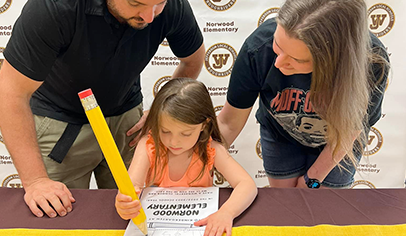Don't you love the start of school?
Everyone is all smiles and hugs in August and September. Teachers and administrators are refreshed and ready to dive in. The classrooms are organized, the halls are clean, and the spirit of learning fills the air. Families are happy to reestablish the routine of school. Even the students are excited to see their friends again, meet their teachers, and get back into the swing of things. Enthusiasm comes easily in September.
For a parent group, the start of the new school year is charged with energy. Officers and committee leaders are well rested, having long forgotten any burnout from last June. What an opportunity!
The challenge for any parent group in the fall is to capitalize on the excitement of a new year. This is the time to make a strong impression, to enlist the volunteers, and to get moving quickly. Even if your group is facing serious challenges such as a poor reputation, past financial difficulties, or low participation, a few well-prepared, enthusiastic leaders can help turn things around. As the year continues, the challenge becomes to build on the momentum of the fall and keep up the enthusiasm and commitment so your last event is as successful as your first.
Do things well as the year begins and you can establish your group with a solid base of support and direction for the year ahead. Do these things poorly and the group might start off with a promising bang, then fizzle out as volunteers drift away.
Here are some tips and ideas for starting the year off strong, and then keeping the momentum going all year long.
Communicate Like It's the First Time
At the start of the year, it is especially important to make a splash. Be visible, be vocal, and be positive. Have representatives at all school activities, such as open house and Meet the Teacher Night.
If you hold a general meeting during the first few weeks of the school year, this may be a crucial chance to make a positive impression on the school community. Many parents and teachers attend just the first meeting of the year. When it's over, they either mentally plan to get involved or walk out of the meeting sorry they wasted the evening.
The executive board should take some time to plan well for this first meeting. Be sure to announce meeting details repeatedly: date, location, duration, and why parents should come. At the meeting itself, an agenda, nametags, and sincere welcome are essential.
Your first meeting should describe the activities planned for the year, the financial picture of the group, and different ways members can get involved.
One of the biggest mistakes a group can make is to assume that the parents already know what the PTO does. There will always be parents new to your community and parents who, for whatever reason, have not been involved in PTO activities in the past. Don't assume everyone knows what you do. Communicate like this is the very first time anyone has ever heard about your organization.
Many groups send home a welcome packet during the first week of school. This material can include a statement about the mission of the group; a description of all planned activities for the year; names and phone numbers for officers and committee leaders; dates and times of meetings; a description of all volunteer opportunities, including required time commitment; and a sign-up form for volunteering.
The welcome packet might also include a PTO membership form, if you have formal membership; an order form for school T-shirts; and a form for the school directory.
The goal of a welcome packet is to provide all parents and teachers with a comprehensive introduction to your parent group. Try to design a complete welcome packet that preempts complaints such as "Nobody ever told me about that."
Throughout the year, continue to communicate with your members and the school community. Reconfirm key dates and deadlines as they draw close. Announce new activities well in advance. Continue to reach out to prospective members and volunteers.
Newsletters, bulletin boards, flyers, school signage, and back-pack notes are tried and true methods of spreading the word. With the proliferation of electronic communication, many groups use their own websites and emails to keep their members abreast of activities. If the role of chief PTO communicator is assigned to one specific executive board member such as the secretary, then she can ensure that nothing is overlooked.
Set Expectations To Point the Way
At the start of any project, it is important to set the expectations before the enthusiastic volunteers take off. The executive board can show leadership by writing a clear mission for each committee and event and specifying financial parameters, deadlines, and reporting requirements. Many parent groups start the year by distributing folders to each committee chair with this information so everyone starts with the same base knowledge.
Setting expectations is not micromanaging. Rather, it empowers your volunteers so they head off in the right direction and stay on track to completion. When they know what is expected, the committee members best manage their time to achieve all the goals. You avoid stepping on toes, duplicating work, and leaving important tasks undone. The enthusiasm of a new year can quickly be squashed when an officer tells a volunteer he missed the point.
Even more damaging to the organization is a committee of once-dedicated members who feel underappreciated because their outcome did not match what the officers expected. It's a lot easier to set expectations at the start than to undo poor work at the end.
Spread the Workload To Avoid Burnout
Burnout. Every dedicated PTO volunteer knows the signs. You take on too much, the deadline comes up too fast, someone drops the ball, your family eats take-out for a week, and after the event, you vow never to commit so much of yourself again. Burnout can be devastating to a parent group. If strong members give up on the group, then their sense of frustration turns off others who see the PTO as the black hole of volunteerism. One of the easiest ways to avoid burnout is to spread the workload to many members.
Delegation does not necessarily come easily to the PTO super-volunteer. However, it is very likely that there are parents in your school who are anxious to help out—if someone just asks. Chairmen must contact everyone who signs up for their committees, newcomers and old friends alike.
Though it takes some creativity and trust, chairmen must identify tasks that can be delegated to various helpers. Volunteers are turned off if they are not put to work. Don't ever tell an eager volunteer: "Thanks anyway. We've got it covered." Participation, even in a small task, helps train future leaders and builds experience that will improve the organization in the long run. Plus, spreading the workload means your super-volunteers are less likely to feel the exhaustion and frustration of burnout.
Build Pride
If you want people to stay active in your group for the long-term, take steps to build pride in your members. Pride can be accentuated with simple things like a parent group logo or slogan. Letterhead, T-shirts, and posters featuring the PTO symbols help tie together work done by separate committees into a cohesive theme for the group.
Deep-rooted pride, the kind that carries members through tight deadlines and project obstacles, comes from a sense of ownership. If volunteers feel responsible for the success of their project and in control of the outcome, then they will develop a feeling of ownership. Most people naturally take pride in what they consider their own creation; a PTO project or committee is no different.
Pride can also come from participation. Our Lady of Refuge Elementary School in Orchard Lake, Mich., has a solution for low participation. Like many private and parochial schools, Our Lady of Refuge requires each family to contribute volunteer hours—in this case, 40 hours per year. Sandra Flynn, Refuge parent, says that the mandatory hours actually increase parent pride. "This policy gets parents directly involved in the school who might not otherwise. Someone helps you on a project, so you want to help the next person. We are able to provide important programs for our students because of the high level of parent support."
Even if your school doesn't mandate volunteerism, you can increase participation in more subtle ways. If your PTO leaders—officers and committee chairpeople alike—demonstrate their own sense of pride, the joy that comes from involvement, and a sincere desire to welcome newcomers, parents will be eager to jump on the PTO bandwagon.
Appreciate the Hard Work
There is probably something worth celebrating about your group every month. And yet most of us wait until the end of the year for our volunteer appreciation event. While a year-end wrap-up event is useful, there are milestones throughout the year that deserve recognition.
The various communication tools the parent group uses to announce dates and times should also be used to thank individuals for their commitments. For example, the PTO bulletin board could display a list of committee members for the recent family night. Photographs and quotes from happy attendees can further underscore the success of the event. A poster can be added to thank the planners for their hard work and to congratulate them on a job well done.
Consider including the students' names in your thank-you announcements. For example, "Thank you to Christine Mulvaney's mom, Carol..." shows appreciation to the volunteer while also stirring pride in her child.
Celebrations do not need to be elaborate to be effective. A simple thank-you in the school newsletter often can suffice. Even better is a hand-written note from the executive board to the committee chair to share with the committee members.
People who feel appreciated are more likely to continue to participate in the group. And even if you tell yourself that you're doing this for the kids, not for the recognition, it's still nice when someone takes the time to say "Thank you for your efforts."
Keep Plugging Away
Like any volunteer organization, a PTO survives on the enthusiasm and commitment of its members. If your group's leaders invest some time in preparation, the internal workings of the PTO machine will keep humming all year long.















